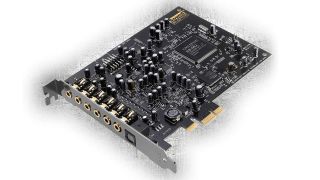The main thing to keep in mind when you’re looking at getting a sound card is that in addition to the sound card, you will also need new computer speakers, or one of the best headphones (opens in new tab) to take advantage of it. Sound cards will improve the sound quality of your system, but if you don’t have the appropriate speakers or headset, you will never notice the difference. One of the major reasons gamers use dedicated sound cards is for the reduced CPU usage, although many dedicated graphics cards will now handle some of the audio load too. The sound card offloads work from your CPU or GPU, which in return gives you better overall frame-rates while gaming. If you’re not a gamer, this may not make a lot of sense, but for gamers, this is a huge deal. You will, of course, also receive improved sound, which is ideal for games that use surround sound to help you identify where enemies are located or where they are shooting. Sound enthusiasts will also find a little extra joy from games like Fortnite and Red Dead Redemption 2. These game makers spent thousands if not millions of dollars making sure the sound quality and sound tracks of their games is well above par. If you’re looking for an internal sound card, we like the Creative Sound Blaster Audigy FX (opens in new tab), which comes in either a 5.1 sound or 7.1 sound variety. Onboard audio (the audio that comes with your motherboard) is by no means bad in any way and, for most people, it is more than enough for everyday use. If you do choose to purchase a sound card, almost anyone who knows what they are talking about will tell you to spend the extra money and get a high-end or professional card. Purchasing a mid-range card will give you little to no noticeable difference and will still end up costing you a lot of money. Higher-end cards include digital input and output ports, and many other ports needed for gaming, sound recording or simply listening to your favorite music. However, if you’re buying a sound card to listen to regular music via Spotify, all you’re really doing is throwing away of lot of money. Dedicated sound cards require the correct audio files and, of course, the right equipment to perform at their peak level. What we’d recommend - if you want to boost audio, but don’t feel you need a dedicated sound card - is to get an ’external’ sound card. This is basically a small processing unit that plugs into your PC via a regular headphone connection or USB. The end result is an overall improvement in the basic sound outputted by your PC or laptop, along with external control over it. Many gaming headsets use these specialized DACs to improve and manipulate the audio you get, no matter how versatile your device’s onboard sound is. We recommend the HyperX Amp (opens in new tab) for anyone interested in this solution - it’s cheap, powerful, and easy to set-up. So, are dedicated sound cards worth it? If you’re willing to spend the time and money to get the right card and equipment, they are definitely worth the improved sound. If you stand more on the casual side of things, the onboard audio that comes with your motherboard will most likely be more than enough for your gaming or music needs. If you’re in the middle, well, an external sound card is perfect, as you can just plug it in and go.
